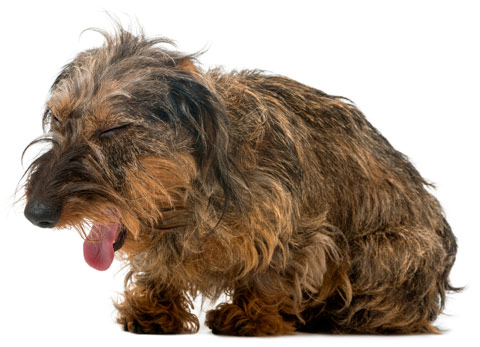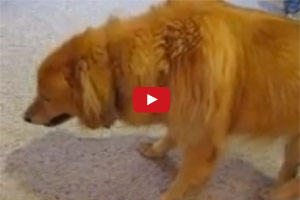Kennel Cough: Infectious Tracheobronchitis in Dogs

You're in a deep sleep when a sudden harsh, jarring noise startles you awake. It takes you a moment to realize that your dog made the sound, but you become fully alert when she repeats it a few times from the foot of your bed. You jump up, concerned that something might be stuck in her throat because that's what it sounds like, and she's holding her neck outstretched as though she's trying to get something to come up.
As you get ready to dial the emergency vet, your heart pounding, you wonder what she could have swallowed. As the phone is ringing, your dog settles and lies back down, peaceful again and apparently breathing fine. The helpful receptionist who answers the phone tells you to set up an examination appointment in the morning because your dog might have kennel cough.
What Is Kennel Cough?
Kennel cough is a term commonly used to describe an infectious condition of the trachea and bronchioles of the lungs in dogs. The classic sign of canine kennel cough is a harsh, paroxysmal cough that may worsen when the dog gets excited or pulls against her collar.
Multiple different organisms can result in kennel cough, and most of the time, more than one infectious agent is involved in a clinical case. Some of the organisms that can cause the signs of kennel cough are:
- Bordetella bronchiseptica bacteria
- Parainfluenza virus
- Adenovirus type 2
- Canine herpesvirus
- Canine distemper
- Canine influenza
- Mycoplasma canis
When an infected dog coughs, the causative microorganisms are released into the air or deposited on toys or food bowls where a healthy dog can breathe them in or ingest them and become infected. Dogs usually show signs of kennel cough between four and ten days after exposure to these microorganisms.
A dog doesn't need to have been in a kennel or boarding facility to develop this condition but only has to have been exposed to a dog that has it. However, the illness is most commonly passed around in situations where dogs are housed or kept together in crowded conditions with warm, poorly circulating air. Boarding and grooming facilities, veterinary hospitals, pet stores, and puppy classes are all common places for kennel cough to get a foothold and spread.
Signs of Kennel Cough
The main sign shown by most dogs with kennel cough is a harsh, dry cough. It sounds a bit like a goose honking. It can appear to be quite violent, sometimes appearing as though the dog has something caught in her throat. However, with uncomplicated kennel cough cases, the dog eats and acts normally between coughing fits, has good energy levels, and appears completely fine otherwise.
Dogs with complicated kennel cough, in which the infection has moved into the lungs and become pneumonia, may show some or all of the signs below.
- Lethargy
- Reduced or absent appetite
- Fever
- Discharge from the eyes or nose
- Productive cough
- Weight loss
- Trouble breathing
Complicated cases of kennel cough are more likely to occur in young puppies, older dogs, dogs that have concurrent illnesses, and those that take immune-suppressing medications.
If your dog is coughing, you should make an appointment with a veterinarian to determine whether the condition is kennel cough or some other cause of coughing in dogs. The doctor can also ensure that your dog is suffering from the uncomplicated form of the illness.
Be sure to explain that your dog has a cough while making the appointment so veterinary personnel can take appropriate precautions when you arrive at the clinic. Due to the contagious nature of kennel cough, they may ask you to keep your dog in the car until they can take her directly into an exam room rather than having her sit in the waiting room.
Diagnosis of Kennel Cough
When you take your dog to the veterinarian for a cough, the first thing the doctor will do is take a complete history from you to find out how long the cough has been going on and whether there are any other signs of illness being displayed along with it.
Next, a thorough physical examination will be performed, including the taking of a temperature and a close listen to your dog's heart and lungs with a stethoscope.
This video demonstrates what a dry cough sounds and looks like in a dog. Please do not use this video to diagnose your dog yourself; coughs due to various causes can sound and look the same. Visit your veterinarian for a proper diagnosis.

The doctor may want to order a chest x-ray or blood work if there is any concern that the illness is something other than kennel cough or that pneumonia might be present.
A heartworm test may be ordered if your dog is overdue for one or hasn't been on heartworm preventative because heartworm disease is another common but often more serious cause of coughing in dogs.
Treatment of Kennel Cough
Treatment for kennel cough in dogs varies depending on the severity of the case. Uncomplicated cases of coughing without fever, decreased appetite, or lethargy generally require little if any treatment. Cough suppressants and rest may be all that is necessary. Sometimes bronchodilators can be used with good effect. Dogs with kennel cough should always be isolated from other dogs because it is an extremely contagious condition.
Never give your dog any medications without checking with your veterinarian first; some are toxic to dogs.
In more severely affected dogs with complicated cases of kennel cough, antibiotics, hospitalization, or intravenous fluids may be required for support.
Prevention of Kennel Cough
There are vaccinations available against several agents that cause kennel cough: Bordatella, canine adenovirus 2, canine influenza, canine distemper, and parainfluenza. While these vaccines do not provide dogs with complete protection against developing infectious tracheobronchitis, they do prevent some cases and can also decrease the severity of others.
Your veterinarian can determine which type of kennel cough vaccine would be best-suited for your dog as well as when and how often she should get it.
If your dog develops kennel cough, you should isolate her from other dogs until it is resolved. If you have other dogs in your home, separate them if you can and thoroughly clean any bedding, bowls, or toys that the sick dog uses before allowing the other dog(s) access to them.
A Note About Canine Influenza
In the spring of 2015, an outbreak of canine influenza began in the United States around Chicago. This outbreak has been determined to be caused by a new strain of canine influenza virus: H3N2. Like kennel cough caused by other microbes, this illness can present as mild and self-limiting or progress to pneumonia and even become life-threatening. You can learn more about this outbreak here: "Canine Influenza."
You May Also Like These Articles:
Dog Adoption: What You Need to Know
Pet Stores Selling Shelter Dogs
Mutts: Mixed Breed Dogs and Why They're Great - Slideshow
Dog Neutering: Is Earlier Better?
How to Be Prepared for Your Dog's Veterinary Bills
How to Prevent Separation Anxiety in Your New Dog
Disclaimer: This website is not intended to replace professional consultation, diagnosis, or treatment by a licensed veterinarian. If you require any veterinary related advice, contact your veterinarian promptly. Information at DogHealth.com is exclusively of a general reference nature. Do not disregard veterinary advice or delay treatment as a result of accessing information at this site. Just Answer is an external service not affiliated with DogHealth.com.
Notice: Ask-a-Vet is an affiliated service for those who wish to speak with a veterinary professional about their pet's specific condition. Initially, a bot will ask questions to determine the general nature of your concern. Then, you will be transferred to a human. There is a charge for the service if you choose to connect to a veterinarian. Ask-a-Vet is not manned by the staff or owners of DogHealth.com, and the advice given should not delay or replace a visit to your veterinarian.



